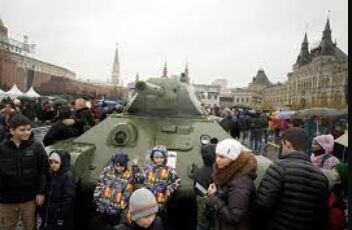NATO Member Countries Freeze Participation in Key Security Treaty Following Russia's Withdrawal, Heightening Concerns over European Arms Control
NATO member countries freeze participation in key security treaty following Russia's withdrawal, raising concerns about arms control in Europe and the future of international agreements.
In a move that has raised fresh questions about the future of arms control agreements in Europe, NATO member countries that signed the Treaty of Conventional Armed Forces in Europe (CFE), a key Cold War-era security pact, have frozen their participation just hours after Russia's withdrawal.
U.S., NATO TO SUSPEND PARTICIPATION IN LANDMARK COLD WAR ARMS TREATY WITH RUSSIA || NATO FREEZE ON CONVENTIONAL FORCES IN EUROPE TREATY FOLLOWS RUSSIA'S FORMAL WITHDRAWAL -- WSJ
— RedboxGlobal (@RedboxWire) November 7, 2023
RUSSIA'S EXIT FROM COLD WAR ARMS TREATIES UNDERMINE SECURITY, NATO SAYS - WSJ
The CFE, signed in 1990 but not fully ratified until two years later, aimed to prevent the massing of forces by Cold War rivals at or near their mutual borders. NATO stated that the action taken by its signatory members was necessary because it would be unsustainable for Allied State Parties to abide by the treaty while Russia does not. The German foreign ministry emphasized that Germany and its allies are not pulling out of the treaty, and a renewed implementation of the CFE remains possible in the event of a fundamental change in Russia's behavior.
The suspension of obligations by Washington and its allies, according to US National Security Adviser Jake Sullivan, will strengthen NATO's deterrence and defense capacity by removing restrictions that no longer bind Russia after its withdrawal. Sullivan also condemned Russia's continued disregard for arms control, stating that their actions further demonstrate Moscow's disregard for these agreements. However, this represents another blow to the arms control landscape, with several major treaties involving Russia and the US being crippled in recent years.
Last week, Russian President Vladimir Putin signed a bill revoking Russia's ratification of the Comprehensive Nuclear Test Ban Treaty, claiming the move was needed to establish parity with the United States. In February, both countries suspended their participation in the New START Treaty, the last remaining arms control pact between them. Furthermore, in 2019, they pulled out of the Intermediate-range Nuclear Forces Treaty. The CFE, which initially envisaged weapons limits for the Warsaw Pact and NATO, saw unsuccessful attempts to renegotiate its conditions following the dissolution of the Warsaw Pact. Russia suspended its participation in 2007 and announced its intention to completely withdraw in 2015.
The recent escalation of tensions between Russia and Ukraine adds further complexity to the arms control landscape. In February 2022, Putin sent hundreds of thousands of Russian troops into Ukraine, which shares borders with NATO members that signed the CFE. The Russian Foreign Ministry blamed the US and its allies' allegedly "destructive position on the treaty" as well as developments in Ukraine and NATO's expansion for Moscow's decision to withdraw from the CFE. The ministry stated that even the formal preservation of the treaty has become unacceptable from Russia's perspective due to its fundamental security interests.
Consequently, concerns have been raised about the future of arms control in Europe. William Alberque, director of Strategy, Technology, and Arms Control at The International Institute for Strategic Studies, has stressed the need for more transparency, risk reduction, and guardrails on competition to prevent a devastating arms race. Managing the competition between Russia and NATO is crucial to maintaining peace in the region. NATO has affirmed its commitment to reducing military risk, preventing misperceptions, and conflicts. The alliance will continue to consult and assess the implications of the current security environment on the Euro-Atlantic region's security. The freezing of participation by NATO member countries in the CFE highlights the urgent need for dialogue and efforts to restore conventional arms control in Europe.




